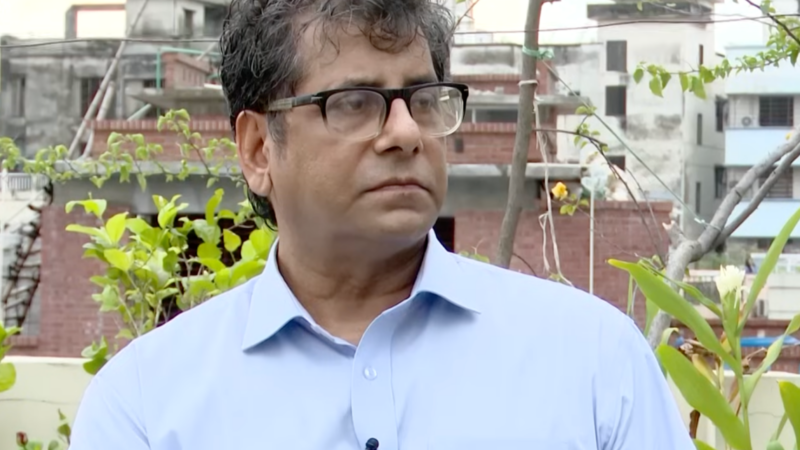
Since Hamas started the current conflict in Gaza, Pakistan has responded to the Israel-Hamas war with an unusually measured tone, standing out among Asia’s Muslim-majority countries. The Pakistani government is typically a harsh critic of Israel, with which it has no diplomatic relations, and a defender of Palestinian rights. But while countries such as Indonesia and Malaysia have pointedly blamed the conflict on Israeli policy, Pakistan has so far taken a softer approach.
While extending greetings on the auspicious occasion of Eid ul-Fitr, Pakistan’s Prime Minister Shehbaz Sharif once again outrageously equated Kashmir to Palestine.The Pakistani premier made a provocative remark in a lengthy post on X. In his post, Sharif claimed that Kashimirs and Palestinians are facing atrocities of the ‘worst kind’.
While virtue-signalling progressives and antisemitic Islamists find common ground celebrating Hamas, what are they really doing to save Palestinian lives?
In March, the head of the political bureau of Hamas, Ismail Haniyeh, has called on Pakistan’s new government to take an active role in influencing Israel” and its supporters to agree on an immediate ceasefire in Gaza.The Palestinian Resistance official praised other nations’ and organisations’ efforts to help Palestine, adding Pakistan’s prime minister should also put pressure on Israeli regime backers to end the murderous onslaught.
When the war in Gaza broke out last year in October, then Interim Pakistani Prime Minister Anwaar ul Haq Kakar had posted on X that he was “heartbroken” by the violence. “We urge restraint and protection of civilians. Enduring peace in the Middle East lies in a two-state solution with a viable, contiguous, sovereign State of Palestine.”
Even Molana Fazal ur Rehman, chief of Jamiat Ulema-e-Islam (F) — the leading Islamist political party in Pakistan — asked the Palestinians to respect the human rights of Israelis. This was unprecedented, since Islamist leaders in Pakistan are known for their staunch pro-Palestinian stance.
Kakar was not the first to indicate a softer approach towards Israel. In 2021, Pakistan President Arif Alvi stirred a controversy by proposing a “one-state solution” to the Palestine problem in a significant departure from established policy, prompting the caretaker government to distance itself from the remarks and calls for his resignation. “If the two-state solution was not acceptable to Israel, then the one-state solution was the only way where Jews, Muslims and [a] good percentage of Christians could live to exercise equal political rights,” the original press release quoted Mr. Alvi, as advising Palestinian President Mahmoud Abbas.
Could this be the result of a careful introspection on part of Pakistan? In Pakistan where anti west protests are routine, protests against Israel are yet to be seen. There have been no announcements of “Death to Israel” rallies, which were common in the past. Nevertheless, a measured reaction on the atrocities in Gaza leads one to speculate about the chances of Islamabad someday normalising ties with Israel.
Pakistan or ‘land of the pure’ has always portrayed itself as a champion of the Palestinian cause. Just after gaining their own independence in 1947, the Pakistanis attempted to supply soldiers and armaments in the 1948 Palestine War and then the Pakistani Air Force participated along with the Arab forces in the ‘Six Day War’ in 1967 and in the ‘Yom Kippur War’ in 1973.The Pakistani passport is still inscribed with a line ‘This passport is valid for all countries of the world, except Israel’. But like everything in the Pakistani narrative, the espousal of Palestine is insincere, nothing more than a popular rallying cry for all Pakistanis.
Brigadier Zia-ul-Haq participated in the infamous ‘Black September’ operations serving along with the Jordanian forces, as they butchered 3,000 Palestinians. Later as President, Zia directed his Inter Services Intelligence (ISI) to establish contacts with the Israeli Mossad, and under the aegis and cover of machinations that facilitated the Afghan mujahedin war against the Soviets in the 1980s, the Israelis gave weapons and other form of support.
Islamabad has chosen a dual policy while coping with Israel. In public there is clear hate towards it. Pakistan usually does not officially speak regarding any contact or relations with Jewish state. Publicly and officially, Pakistanis kept harping on the Palestinian cause. But, Islamabad is aware that its official fixation with religiosity was also getting a bit dated as many of the Arab countries had started normalising relations with Israel. Now the question of recognising Israel is not a taboo in Pakistani society.
In ‘Beyond the Veil, March 2000’ Professor Kumaraswamy, in a study under Jaffee Center for Strategic Studies, says that Pakistan and Israel chalked out understandings on important security matters, including the nuclear issue. During Afghan jihad Pakistan and Israel being on same side, the latter helped Pakistan in the UN to get some votes for Afghan resolution and on a couple of occasions Israel provided arms to the mujahidin through a third party.
But the open debate on the recognition issue started with the statement of ex ruler of Pakistan Pervez Musharraf who urged the countrymen to consider recognizing Israel.
When the ‘Abraham Accords’ were getting implemented, Pakistan was under Imran Khan, who indulged in some grandstanding and theatrical posturing in favour of Palestine. Yet in May 2022, then Israeli president confirmed meeting with a Pakistani delegation but did not reveal the identities of the members of the delegation. He further stated that the meeting with the Pakistani delegation was “very welcome” and that he was pleasantly surprised because no Pakistani delegation had ever visited Israel before. Prior to this, Anila Ahmed, a Pakistani-American, shared a photograph on Twitter of her meeting the Israeli president on May 12. In the photograph, she is presenting a book written by her father Qutbuddin Ahmed on Tehreek-e-Pakistan and Quaid-e-Azam to the Israeli president. Pakistan Television (PTV) anchor Waqar Qureshi was also part of the delegation.[1]
The United Arab Emirates and Bahrain normalised their relations with Israel in September 2020 by signing the Abraham Peace Accords in Washington. Pressure is mounting on Pakistan from its close allies in the Gulf region to recognize Israel. Pakistan, which enjoys multifaceted cooperative relations with all states of the Gulf Cooperation Council (GCC), now faces a dilemma, as it has a longstanding position on the Palestine issue through which it views its policy on Israel.
In the aftermath of the Israeli attack on Gaza, when almost all Islamic countries openly sided with the Palestinians and attributed the recent tensions to Israel, Pakistan offered a rather meek and guarded official position (considering its usual bombast on the issue) with its interim Prime Minister saying, “We urge restraint and protection of civilians. Enduring peace in the Middle East lies in a two-state solution with a viable, contiguous, sovereign State of Palestine”.
Pakistan’s Foreign Office (FO) did no better with, “We are closely monitoring the unfolding situation in the Middle East and the eruption of hostilities between Israel and Palestinians. We are concerned about the human cost of the escalating situation.”
Compared for instance to the Malaysian position which explicitly posited, “The confiscation of land and property belonging to the Palestinian people is done relentlessly by the Zionists. As a result of this injustice, hundreds of innocent lives were sacrificed” the Pakistani weakly worded position against Israel indicates that Pakistan has its own interests foremost. It is confronting unprecedented economic challenges and is in dire need of bail-out options. At this juncture supporting Hamas and it could only offend the Western countries and multilateral organisations that are critical to Pakistan’s survival. Hence the passive posturing towards the Palestinian cause lately.
The economic issues have also worn out Pakistanis from the romance of Palestine as they go about their own survival. Mired in anti-terror operations, the Pakistani ‘establishment’ (military) has likely signalled the clergy to ‘go-slow’ and downplay theatrics, thus explaining why a usually dramatic exploiter of religious sentiments like Maulana Fazalur-Rehman was also unusually moderate and well-mannered in expressing concerns for the Palestinians. Thus, the usual parties who arrange ‘Death to Israel’ kind of gatherings, are invisible.
The consensus of earlier years for ‘no recognition’ of Jewish state in Pakistan has certainly ended and many known figures are pointing towards a subtle policy shift on Pakistan’s side.
However, given that Islamabad’s support for the Palestine conflict favouring a two-state resolution is identical to its stance on right to self-determination in Kashmir, if Pakistan recognizes Israel, would it compromise its position on Kashmir.
If Pakistan recognizes Israel, it must also compromise its position on Kashmir, which Pakistani leaders have repeatedly emphasised as an analogous situation to the one in Palestine.
One thing is clear: the Gaza war and geopolitical developments in the Middle East have exposed Pakistan’s double standards on the Palestinian issue.
______________________________________________________________
[1] Israeli president confirms meeting delegation of Pakistani expats (tribune.com.pk) https://tribune.com.pk/story/2358953/israeli-president-confirms-meeting-delegation-of-pakistani-expats






